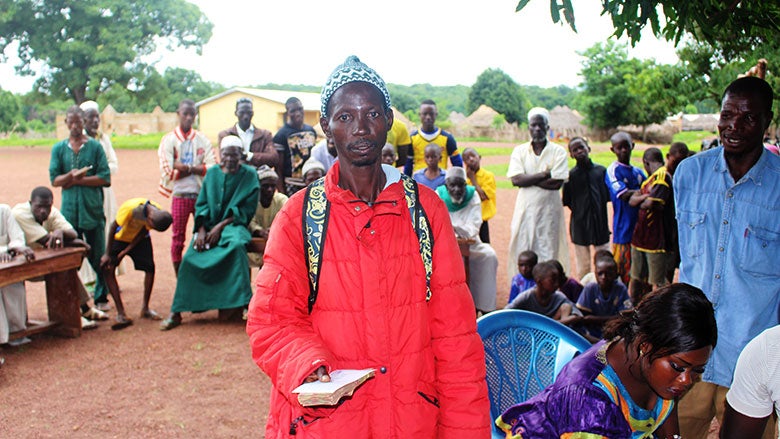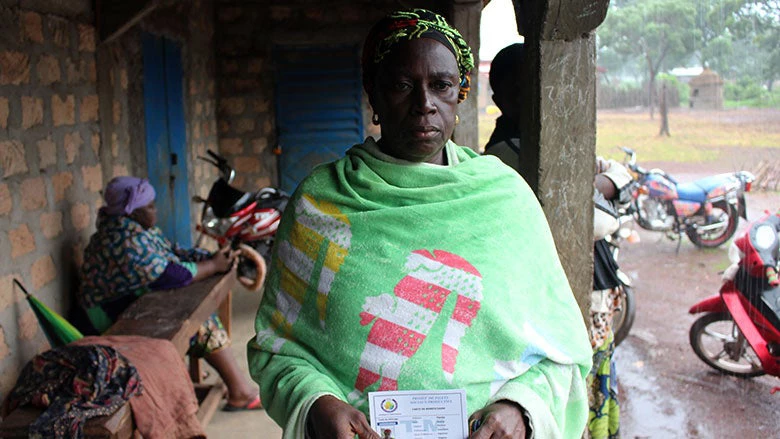
On my first project visit since joining the World Bank, I had a chance to accompany the Productive Social Safety Nets project team across the country to the Fouta Djallon region, in the northern part of Guinea, for the launch of their Labor Intensive Public Works (THIMO) activities. This trip allowed me to see firsthand what extreme poverty is. You hear and read about it, but I had the opportunity to meet people who experience it every day. I say opportunity, because going through this further humbled me, gave me more determination, and added purpose to the need to tell their stories—stories of their struggles and their achievements.
Poverty affected about 55% of Guinea’s population in 2012, but this percentage is likely to have increased as a result of the Ebola crisis and economic stagnation in 2014 and 2015. Poverty in Guinea is highly concentrated in the rural areas, where the poverty headcount rate remains far higher (65% in 2012) than in urban centers (35%). The lack of infrastructure, and limited economic opportunities and access to education all create a major development issue for these areas.
The development challenges for Guinea are significant, and somehow illustrated by the fact that it took us over four hours to travel 65 kilometers (40 miles) to get to one of the villages covered by the program. The World Bank, with the government of Guinea, is implementing the Productive Social Safety Nets program in the four “natural” regions of Guinea. A good 47 out of 171 THIMO micro-projects are being put into place in the fight against poverty, and will offer an opportunity to improve the daily lives of over 5,000 households with payments in exchange for maintenance, sanitation, and the rehabilitation of public works in their localities.
Projects
These projects, for a total cost of $1.1 million, will be completed in 60 working days, and each worker will receive 30,000 GNF as a daily wage for a total amount of 1,8 million GNF ($200) at the end of the program. It is important to note that the minimum monthly wage in Guinea is 440,000 GNF (about $50), so this represents an important sum of money that can have an impact on the life of a beneficiary if used wisely.
In order to promote the better use of income by households, workers are supervised by Village Management Committees, and supported with training in life skills, such as budget management. Since 2014, over 32,000 beneficiaries have received cash payments totaling $4.2 million to execute 219 micro projects.
Cash Transfers
Another component of the Productive Social Safety Nets initiative is a cash transfer program that directly targets the poorest of the poor in Guinea. This program supports households with monthly cash transfers and activities to help them and their communities build resilience, improve, and diversify their livelihoods, and ensure that essential school and health services expenses are met.
These efforts include helping vulnerable and marginalized households to learn to manage their day-to-day expenses, making education, health, and other important services more accessible to them.
This assistance was critical for farmers like Lancinet Keita "I have been sick for the past five years and I cannot do farm work. I want to recruit young people with some of my money to plant cashews for me. I cannot afford to take care of them myself. The profits from my harvest will feed my family. Even after my death, my children will continue to benefit from my cashew field. I thank and bless the project. "
Since 2015, about 1,670 low income beneficiaries have received a total $333,275 in cash transfers, and another 25,000 will benefit from this initiative through $16 million in additional financing for the program.
Among the beneficiaries, there are many women, often widows, like Fanta Keita "My husband died and I cannot afford to support my family. This money came at the right time and will help me a lot. For a long time, I wanted to start a small business, but I did not have the means. As soon as I received the cash payment, I handed part of the amount to my son to buy gasoline that I will resell to make a profit. "

Helping Villages and Children
Although physically demanding (over 20 hours in all by road), the trip was well worth it because it allowed me to meet beneficiaries and actually see firsthand the impact of World Bank’s work on the ground.
During my stay at one of the villages in the Koubia Prefecture, I met an eight-year-old orphan named Moumin (his name means “believer” in Arabic) who accompanied his aunt to the launch of THIMO work activities.
The project will help children like Moumin have access to a better education, and to basic social services like health and nutrition. In the long run, I believe children like him can have an impact on the development of Guinea if they are helped in the right way. To me, he represents what Guinea is all about—resilience in times of hardship and a bright future.
Guineans have defeated Ebola and its legacy of stigmatization, as as a host of other problems, such as low commodity prices, internal social strife, a military junta, and they are still striving to improve. According to the IMF, real growth is expected to reach 6.7% in 2017.
By assisting communities to get involved in productive activities, the Bank can contribute to reduce poverty levels in Guinea.
Impact on the Ground
- Over 32,000 beneficiaries have received cash payments totaling $4.2 million to execute 219 micro projects since 2014;
- 1,668 low income beneficiaries have received a total $333,275 in cash transfers since 2015;
- Another 25,000 beneficiaries will benefit from this initiative through US$16 million additional financing for the program;
- Significant community mobilization activities and training for women on income generating productive activities and community project.


Join the Conversation